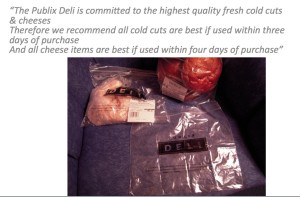Publix Super Markets Inc., a Lakeland, Fla., retail grocery store chain is voluntarily recalling an undetermined amount of ground beef products made from chuck that may be contaminated with Escherichia coli O26, the U.S. Department of Agriculture’s Food Safety and Inspection Service (FSIS) announced today.
 The ground chuck items were purchased by consumers from June 25, 2018, through July 31, 2018. The following products are subject to recall: https://www.fsis.usda.gov/wps/wcm/connect/330436d0-f5bb-4ee3-a3eb-cca6459bf014/072-2018-List-Products.pdf?MOD=AJPERES&useDefaultText=0&useDefaultDesc=0
The ground chuck items were purchased by consumers from June 25, 2018, through July 31, 2018. The following products are subject to recall: https://www.fsis.usda.gov/wps/wcm/connect/330436d0-f5bb-4ee3-a3eb-cca6459bf014/072-2018-List-Products.pdf?MOD=AJPERES&useDefaultText=0&useDefaultDesc=0
These items were shipped to Publix Super Market retail locations in the following Florida counties: https://www.fsis.usda.gov/wps/wcm/connect/68f37b9e-2b95-45c9-8ba7-36500f13a6ac/072-2018-Affected-Counties-Florida.pdf?MOD=AJPERES&useDefaultText=0&useDefaultDesc=0
On Aug. 16, 2018, FSIS was notified of an investigation of E. coli O26 illnesses. FSIS, the Centers for Disease Control and Prevention, and state public health and agriculture partners determined that raw ground chuck was the probable source of the reported illnesses. The epidemiological investigation identified 18 case-patients, predominantly from Florida, with illness onset dates ranging from July 5 to July 25, 2018. Traceback information indicated that case-patients consumed ground chuck products purchased at various Publix Super Markets that was supplied by a yet-to-be determined source. As this investigation further develops, FSIS will continue to work with the supermarket, suppliers and public health partners, and will provide updated information should it become available.
- coli O26, like the more common E. coli O157:H7, is a serovar of Shiga toxin-producing E. coli (STEC). People can become ill from STECs 2–8 days (average of 3–4 days) after exposure to the organism.
Most people infected with STEC O26 develop diarrhea (often bloody) and vomiting. Some illnesses last longer and can be more severe. Infection is usually diagnosed by testing of a stool sample. Vigorous rehydration and other supportive care is the usual treatment; antibiotic treatment is generally not recommended. Most people recover within a week, but rarely, some develop a more severe infection. Hemolytic uremic syndrome (HUS), a type of kidney failure, is uncommon with STEC O26 infection. HUS can occur in people of any age but is most common in children under 5 years old, older adults and persons with weakened immune systems. It is marked by easy bruising, pallor and decreased urine output. Persons who experience these symptoms should seek emergency medical care immediately
FSIS is concerned that some product may be frozen and in consumers’ freezers. Consumers who have purchased these products are urged not to consume them. These products should be thrown away or returned to the place of purchase.
FSIS routinely conducts recall effectiveness checks to verify recalling firms notify their customers of the recall and that steps are taken to make certain that the product is no longer available to consumers. When available, the retail distribution list(s) will be posted on the FSIS website at www.fsis.usda.gov/recalls.


 And I saw far more in Lakeland that would impact daily food safety than anything the politicians, bureaucrats, hangers-on and chatting classes could ever come up with.
And I saw far more in Lakeland that would impact daily food safety than anything the politicians, bureaucrats, hangers-on and chatting classes could ever come up with. I ordered some shaved smoked turkey breast from the deli, and the sealable bag the meat was delivered in contained the following:
I ordered some shaved smoked turkey breast from the deli, and the sealable bag the meat was delivered in contained the following: